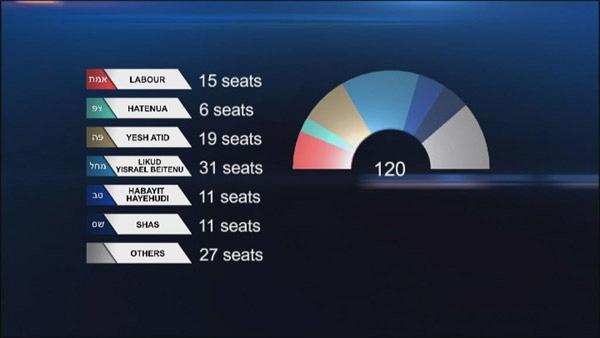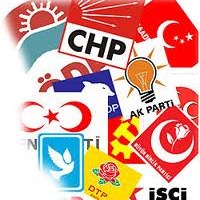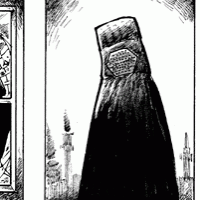![]()
Thu, Jan 24, 2013 | RubinReports | By Barry Rubin
This is a different version of my article in the Ottawa Citizen with a number of additions at the end.
Once in an Irish pub I spotted a pair of drawings on the wall. One, labeled “the Irishman,” depicted a sturdy peasant. The other, entitled, “the Irishman seen by others [or perhaps, by the British]” showed a drunken, loutish fool. Watching Western coverage of the Israeli election reminds me of those sketches.
It was clear before the balloting in Israel that the claims that the population was moving to the right, that radical extremists were about to take over (an argument curiously absent when the Muslim Brotherhood actually does gain power), and that democracy in Israel was imperiled, were flatly wrong. But the results amply demonstrated that fact.
To be generous, at best the external view of Israeli politics is two decades out of date. Elections are not between left and right ideological blocs, Prime Minister Benjamin Netanyahu is not a hardliner or right-winger, and the “peace process” — which most Israelis believe no longer actually exists — is not the prime issue at all.
Roughly, as the 2013 election results confirm, the Israeli electorate does include three blocs which each gain about 10 percent of the vote: the Arab-controlled parties (Communists, Arab nationalists, and Islamist) which never cooperate; Jewish religious parties (“European-origin” and “Middle Eastern” origin, to put it simply) which represent two distinct constituencies; and far right, whose vote count remains roughly the same over many years. Another five percent comprise a left-wing Zionist party.
The remaining two-thirds of the electorate votes roughly in a spectrum that coincides with that of Canada, and it is their choices that provide the main governing parties. They constitute five parties ranging from the center-right Likud of Netanyahu, through three center-center parties, to the moderate left Labour party.
All of these voters are skeptical about Palestinian intentions. They support a two-state solution but doubt that either the Palestinian Authority which rules the West Bank and now says that Palestine is an independent state that doesn’t need to negotiate with Israel or, Hamas, which rules the Gaza Strip and openly calls for genocide of the Jews, is likely to provide a stable, reliable peace.
Given this consensus, the lessons of Palestinian rejectionism in the 1990s’ peace process, and the lack of current opportunity, the election simply did not focus on these issues. It revolved mainly about domestic issues. In economic terms, Israel has done well in recent years, especially compared to Europe and the United States. Now, however, the budget has gotten too big in relations to income, while high prices — especially for housing — have stirred lots of complaints.
The three center-center parties — Yesh Atid (There’s a Future) of Yair Lapid; Hatnua (The Movement) of former prime minister Tsipi Livni; and Kadima (Forward) of former army chief of staff Shaul Mofaz — all appeal to those looking for moderation, attention to domestic issues, and promised good government. These three parties received about one-quarter of the seats.
Lapid did the best. A well-liked television personality who turned to politics, he followed in the footsteps of his father who did precisely the same thing. His success was due to being a fresh face and assembling an impressive team of people from the public sphere none of whom had ever been in parliament before.
Netanyahu gained another one-quarter of the vote, slightly disappointing for him but enough to win. One reason for the slump is that many voted for Lapid with the intention that the two men form a coalition in which Lapid could press Netanyahu on economic reforms and more social spending, among other issues.
Aside from those specific issues, the policies of the next government are likely to be pretty much the same as during Netanyahu’s previous term.
Of course, it will face the big question of whether or not to attack Iranian nuclear facilities if and when that country gets the bomb. There is no clear answer as to what will happen. As on other issues, there is no simple left-right divide on this point, with political, military, and intelligence leaders taking individual stances on both sides of the debate based on their judgment regarding the costs and benefits of such an operation.
There was no turn to the right. Indeed, the two leftist Jewish parties received double the vote of the far right party, which united that portion of the spectrum and had a dynamic new leader but got the usual portion of the vote for that standpoint. Nor is there any enhanced hardline stance. Netanyahu accepted a two-state solution in 1996 and is dealing with a situation in which the Palestinian Authority refused to hold serious talks throughout his entire term, despite favorable concessions and encouragement offered to it by President Barack Obama.
Now the political stage turns to building a new government coalition. President Shimon Peres will give Netanyahu a (renewable) three-week period to get the signatures of parties holding at least 61 seats (a majority of the 120 members) in parliament. This is a complex game of deal-making to establish what each potential partner wants in terms of policies, cabinet posts, and money from the government for its constituencies.
Netanyahu, whose personal relations with the right-wing leader Naftali Bennett are quite strained, though it is possible he would join the government in a position of weakness. Netanyahu would prefer, however, to make a deal with Lapid and the small Kadima Party, which would bring him to 52 of the 61, bridging that gap with a religious party. Both Labour and Livni refuse to join a coalition with him. The process of assembling a coalition is going to be messy and full of rumors.
The bottom line, though, is that Israel has just held a thoroughly democratic election with remarkably little rancor, extremism, or ideology in the midst of the world’s longest conflict and in the world’s most turbulent region. That is the kind of signal achievement the world should be accurately understanding and appreciating.
PS: But of course much of the media coverage and analysis continues to insist on themes that have nothing to do with reality. Here’s the AP piece by Josef Federman:
“In a stunning setback, Prime Minister Benjamin Netanyahu’s hard-line bloc fared worse than expected… possibly forcing the incumbent Israeli leader to invite surprisingly strong moderate rivals into his government and soften his line toward the Palestinians.”
By prevailing standards this is relatively moderate since it at least admits Israelis voted for moderate parties (others continue to insist that the election proves Israel is right-wing, anti-democratic, and anti-peace). But the label “hardline” is editorializing (anyone see the major mass media outlets talking about a hardline Hamas or a hardline Muslim Brotherhood?).
It is not in the least bit surprising that more liberal parties did well because they always do. The only surprise was the distribution of the votes, particularly the large number received by Lapid’s party. Incidentally, Lapid’s views are not that far from those of Netanyahu — as voters knew. For example, he is suspicious of the Palestinian Authority’s willingness to make peace and wants to retain settlement blocs in the West Bank.
And if one understands the real situation then what happened it wasn’t a “stunning setback” for Netanyahu. I’ve spoken to dozens of voters and a large number said something along the following lines:
— We knew Bibi would win so we voted for the party we wanted to be his coalition partner.
— Those more liberal voted for Lapid (though some consciously chose Livni or even Labor for that purpose) while those more on the conservative side voted for Ha-Bayid ha-Yahudi. But these voters, around 25 percent of the total (I’m including only Ha-Bayit ha-Yahudi and Lapid voters here) wanted Netanyahu to be prime minister. In other words, he got a higher proportion of the vote than did Obama in the U.S. election.
Moreover, the AP article makes it appear that the government has been mean to the Palestinians. This point is reinforced by the conclusion:
“The coalition-building process could force him to promise concessions to restart long-stalled peace talks with the Palestinians.”
Since Netanyahu has been trying to hold talks for four years and the Palestinians have refused, plus Hamas is still in power and launched a war against Israel, plus the new Palestinian Authority line is that the peace process is over, it has a state, and doesn’t need to negotiate with Israel, Federman’s analysis is rather ridiculous and is certainly biased.
While the New York Times did a better job of comprehending Lapid than most, it contained a sentence that really bothers me because it is so worded as to make me think the reporter knew she was being dishonest. It reads:
“This was the first election in memory in which such existential security issues were not emphasized, as a growing majority of Israelis see them as too tough to tackle.”
The issue is not that this majority sees such issues “as too tough to tackle” but as just about everyone in Israel knows because it believes that the Palestinian leadership doesn’t want to make peace and seeks to use a Palestinian state as a launching pad for wiping Israel off the map. Many of these people never dreamed before 2000 that they would ever reach such a conclusion. Even if you don’t agree with this as an assessment, it is only honest to report — but is almost never mentioned — that this is what most Israelis think and is the basis for their political behavior. Instead, at worst, Israelis are blamed for the lack of peace — as in the AP story — or their viewpoint and motives are left as being mysterious.
 Barry Rubin is director of the Global Research in International Affairs (GLORIA) Center and editor of the Middle East Review of International Affairs (MERIA) Journal. His latest book, “Israel: An Introduction“, has just been published by Yale University Press. Other recent books include “The Israel-Arab Reader” (seventh edition), “The Long War for Freedom: The Arab Struggle for Democracy in the Middle East” (Wiley), and “The Truth About Syria” (Palgrave-Macmillan). The website of the GLORIA Center and of his blog, Rubin Reports. His original articles are published at PJMedia.
Barry Rubin is director of the Global Research in International Affairs (GLORIA) Center and editor of the Middle East Review of International Affairs (MERIA) Journal. His latest book, “Israel: An Introduction“, has just been published by Yale University Press. Other recent books include “The Israel-Arab Reader” (seventh edition), “The Long War for Freedom: The Arab Struggle for Democracy in the Middle East” (Wiley), and “The Truth About Syria” (Palgrave-Macmillan). The website of the GLORIA Center and of his blog, Rubin Reports. His original articles are published at PJMedia.



 RSS
RSS











Latest Comments
Hello Mike, Thank you for your positive feedback to the article. I felt there wasn’t too much critical analysis of ...
Thanks for this considered and well constructed article. A follow up article on the manner in which the editorial contro...
THE CLUELESSNESS OF CLAIMING THAT OBAMA'S MIDDLE EAST POLICIES WERE A FAILURE CANNOT BE FURTHER FROM THE TRUTH, WHAT THE...
As long as Obama is the president of the usa do not trust the us government......
Thank you for an good read....